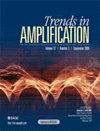一种自动生成字幕以改善电话通信的通信系统的用户评价
引用次数: 17
摘要
本研究考察了在存在胡言乱语噪声的情况下,语音理解过程中自动生成字幕所获得的主观效益。短篇小说通过电话呈现,有或没有字幕,由自动语音识别(ASR)系统离线生成。为了模拟在线ASR,字幕的单词准确率(WA)水平为60%或70%,文本呈现延迟到语音。每次测试后,听力受损的参与者(n = 20)完成了nasa任务负荷指数和几个评估字幕支持度的评分量表。参与者指出,在语音理解中使用错误文本是困难的,报告的任务负荷在音频+文本和纯音频条件下没有差异。在后续实验中(n = 10),呈现字幕的感知收益随着WA水平的增加而增加到80%和90%,并消除文本延迟。然而,总的来说,当提供字幕时,任务负荷并没有减少。这些结果表明,处理文本所需的额外努力可能会被理解语音所需的较少努力所补偿。未来的研究应着眼于降低任务的复杂性,以提高听障人士使用自动提供字幕的辅助通信系统的意愿。目前的结果强调,在评估辅助通信系统时,需要获得客观和主观的效益衡量标准。本文章由计算机程序翻译,如有差异,请以英文原文为准。
User Evaluation of a Communication System That Automatically Generates Captions to Improve Telephone Communication
This study examined the subjective benefit obtained from automatically generated captions during telephone-speech comprehension in the presence of babble noise. Short stories were presented by telephone either with or without captions that were generated offline by an automatic speech recognition (ASR) system. To simulate online ASR, the word accuracy (WA) level of the captions was 60% or 70% and the text was presented delayed to the speech. After each test, the hearing impaired participants (n = 20) completed the NASA-Task Load Index and several rating scales evaluating the support from the captions. Participants indicated that using the erroneous text in speech comprehension was difficult and the reported task load did not differ between the audio + text and audio-only conditions. In a follow-up experiment (n = 10), the perceived benefit of presenting captions increased with an increase of WA levels to 80% and 90%, and elimination of the text delay. However, in general, the task load did not decrease when captions were presented. These results suggest that the extra effort required to process the text could have been compensated for by less effort required to comprehend the speech. Future research should aim at reducing the complexity of the task to increase the willingness of hearing impaired persons to use an assistive communication system automatically providing captions. The current results underline the need for obtaining both objective and subjective measures of benefit when evaluating assistive communication systems.
求助全文
通过发布文献求助,成功后即可免费获取论文全文。
去求助
来源期刊

Trends in Amplification
AUDIOLOGY & SPEECH-LANGUAGE PATHOLOGY-OTORHINOLARYNGOLOGY
自引率
0.00%
发文量
0
审稿时长
>12 weeks
 求助内容:
求助内容: 应助结果提醒方式:
应助结果提醒方式:


